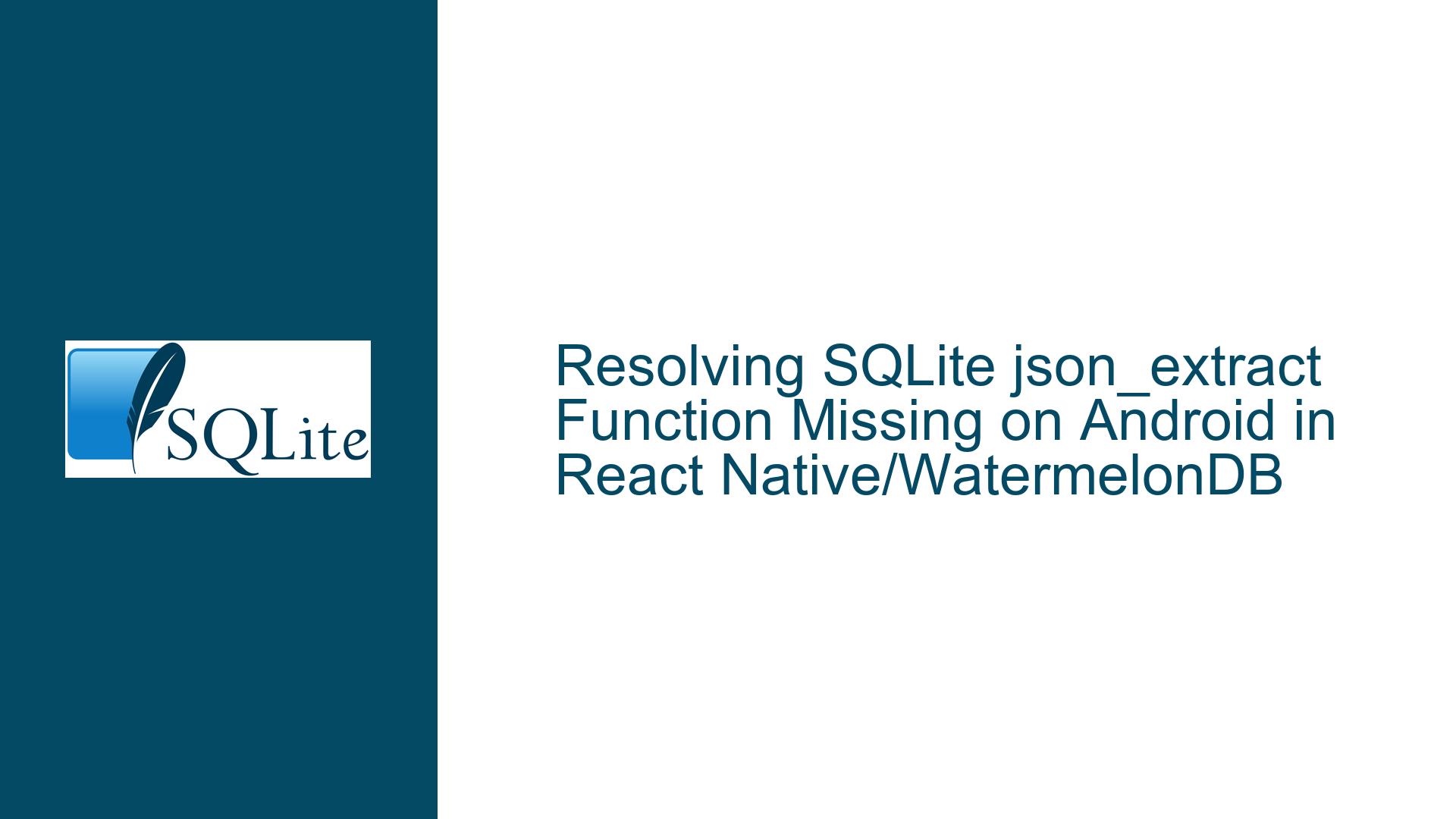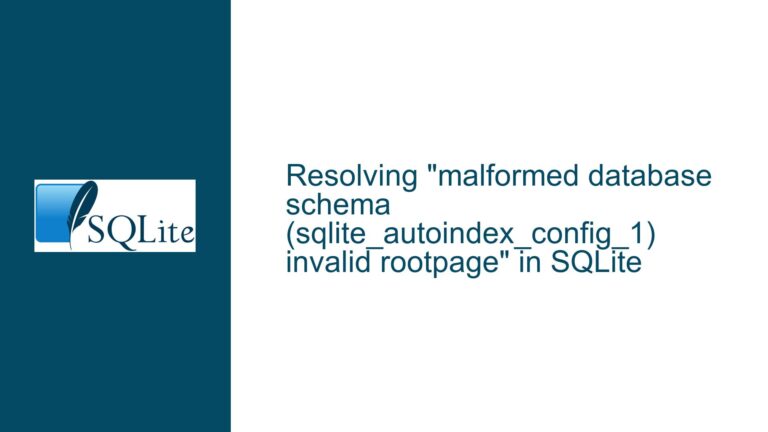Resolving SQLite json_extract Function Missing on Android in React Native/WatermelonDB
Understanding the Missing json_extract Function in SQLite on Android
The absence of the json_extract() function in SQLite on Android while using React Native with WatermelonDB is a platform-specific discrepancy rooted in how SQLite is compiled and integrated across operating systems. This issue arises when queries relying on SQLite’s JSON1 extension work on iOS but fail on Android with the error no such function: json_extract (code 1 SQLITE_ERROR). The JSON1 extension provides critical JSON-processing capabilities in SQLite, including functions like json_extract(), json_array(), and json_object(). Its availability depends on how SQLite was compiled for the target platform. iOS typically includes the JSON1 extension in its system SQLite library, whereas Android’s default SQLite build (especially in React Native environments) often excludes it. This discrepancy creates a fragmentation issue for cross-platform applications that depend on SQLite’s JSON features.
WatermelonDB, an optimized database layer for React Native, abstracts SQLite interactions but does not inherently enable or disable SQLite extensions. Instead, it relies on the underlying SQLite library provided by the React Native runtime or third-party dependencies. The error occurs when the Android-side SQLite library lacks the JSON1 extension, rendering json_extract() unusable. This problem is exacerbated by the fact that many React Native SQLite libraries for Android use a barebones SQLite build to minimize binary size, omitting non-essential extensions like JSON1.
The core challenge lies in reconciling the SQLite feature sets between iOS and Android. Developers must ensure that the SQLite build used on Android includes the JSON1 extension or find alternative methods to process JSON data within queries. This issue also highlights the importance of understanding how SQLite is integrated into React Native projects, particularly when relying on third-party libraries that bundle their own SQLite binaries.
Root Causes of the Missing json_extract Function
SQLite Build Configuration Differences
SQLite’s functionality is heavily influenced by compile-time options. The JSON1 extension is optional and must be explicitly enabled during compilation using the -DSQLITE_ENABLE_JSON1 flag. On iOS, the operating system’s default SQLite library includes this extension, allowing json_extract() to work out of the box. On Android, React Native apps often use embedded SQLite binaries provided by libraries like react-native-sqlite-storage or @nozbe/sqlite, which may exclude the JSON1 extension to reduce binary size or avoid licensing complexities.
For example, the @nozbe/sqlite library (used in WatermelonDB) bundles a custom SQLite build. If this build does not enable SQLITE_ENABLE_JSON1, any query using json_extract() will fail on Android. This is a deliberate configuration choice by the library maintainers, and altering it requires modifying the library’s build process or switching to a different SQLite provider.
Platform-Specific SQLite Implementations in React Native
React Native does not ship with a unified SQLite implementation. Instead, iOS uses the system’s SQLite library, while Android relies on a standalone SQLite binary bundled with the app. This binary is often sourced from community-maintained libraries, which may not prioritize including extensions like JSON1. The lack of a standardized SQLite build across platforms leads to inconsistencies in available functions.
Misconfiguration of WatermelonDB or SQLite Adapters
WatermelonDB uses adapters to interface with SQLite. If the adapter configuration does not specify the inclusion of the JSON1 extension (or uses a SQLite build that lacks it), JSON functions will be unavailable. Developers might assume that WatermelonDB enables these extensions by default, but it ultimately depends on the underlying SQLite library’s capabilities.
Case Sensitivity or Typographical Errors in Function Names
While less common, the error could stem from a typographical mistake in the function name (e.g., Json extract instead of json_extract()). SQLite function names are case-insensitive, but spaces or incorrect underscores would cause the function to be unrecognized. However, the primary issue in most cases is the absence of the JSON1 extension.
Solutions and Workarounds for Enabling json_extract on Android
Step 1: Verify JSON1 Extension Availability
Before making changes, confirm whether the JSON1 extension is available in your Android SQLite build. Execute a simple query to check for JSON support:
SELECT json('{"key": "value"}') AS test;
If this query fails with no such function: json, the JSON1 extension is missing. On iOS, the same query should return the stringified JSON object.
Step 2: Use a SQLite Library with JSON1 Enabled
Replace the default SQLite library in your React Native project with one that includes the JSON1 extension. Two popular alternatives are:
Option A: react-native-quick-sqlite
This library provides a high-performance SQLite interface with precompiled binaries that include the JSON1 extension.
- Install the library:
npm install react-native-quick-sqlite
- Update your WatermelonDB configuration to use
react-native-quick-sqliteas the SQLite adapter. Refer to WatermelonDB’s documentation for adapter setup.
Option B: Rebuild @nozbe/sqlite with JSON1 Enabled
If you prefer to keep using @nozbe/sqlite, modify its SQLite compilation flags to enable JSON1:
- Clone the
@nozbe/sqliterepository or navigate to its installation directory. - Locate the SQLite compilation configuration (typically in
sqlite.gradleor a similar build script). - Add
-DSQLITE_ENABLE_JSON1to theCFLAGSvariable:
CFLAGS = "-DSQLITE_ENABLE_JSON1 ..."
- Rebuild the library and link it to your project.
Step 3: Custom SQLite Build with JSON1
For full control, compile SQLite from source with the JSON1 extension and integrate it into your Android app:
- Download the SQLite amalgamation source code from sqlite.org.
- Compile SQLite with the JSON1 flag:
gcc -DSQLITE_ENABLE_JSON1 -c sqlite3.c -o sqlite3.o
- Create a Android NDK library project and include the compiled
sqlite3.o. - Use JNI to expose SQLite functions to your React Native app.
This approach is complex but ensures all required extensions are available.
Step 4: JSON Processing Outside SQLite
If modifying the SQLite build is impractical, process JSON data in JavaScript instead of SQL:
- Retrieve the entire JSON column:
const results = await db.query('SELECT json_column FROM table');
- Parse the JSON in JavaScript:
results.forEach(row => {
const value = JSON.parse(row.json_column).key;
});
While this workaround avoids SQLite’s JSON functions, it increases data transfer between the database and JavaScript runtime, impacting performance for large datasets.
Step 5: Define a Custom json_extract Function
SQLite allows registering custom functions via its C API. Use a library like react-native-sqlite-2 (which supports custom functions) to implement json_extract() in JavaScript:
- Install
react-native-sqlite-2:
npm install react-native-sqlite-2
- Register a custom function:
import SQLite from 'react-native-sqlite-2';
const db = SQLite.openDatabase({name: 'mydb'});
db.transaction(tx => {
tx.addPlugin('json_extract', (json, path) => {
const obj = JSON.parse(json);
// Implement path extraction logic (e.g., using lodash.get)
return _.get(obj, path);
});
});
- Use the custom function in queries:
SELECT json_extract(json_column, '$.key') FROM table;
This approach introduces overhead but provides a temporary solution until a proper SQLite build is available.
Step 6: Advocate for JSON1 in Upstream Dependencies
If you’re using a third-party SQLite library that lacks JSON1, open an issue or pull request to enable it. For example, the @nozbe/sqlite repository may accept contributions that add the -DSQLITE_ENABLE_JSON1 flag to its build process.
Step 7: Validate Function Names and Syntax
Double-check your SQL queries for typos or syntax errors. Ensure you’re using json_extract() and not Json extract or other variants. While SQLite is case-insensitive for function names, spaces or incorrect underscores will cause errors.
Final Considerations
- Performance: Native JSON processing in SQLite is faster than JavaScript-based solutions. Prioritize enabling the JSON1 extension for large datasets.
- Maintenance: Custom SQLite builds require ongoing maintenance to stay compatible with React Native updates.
- Testing: After making changes, thoroughly test queries on both iOS and Android to ensure consistent behavior.
By systematically addressing the SQLite build configuration, leveraging alternative libraries, or implementing workarounds, developers can resolve the json_extract() missing function error and achieve parity between iOS and Android in React Native apps using WatermelonDB.






